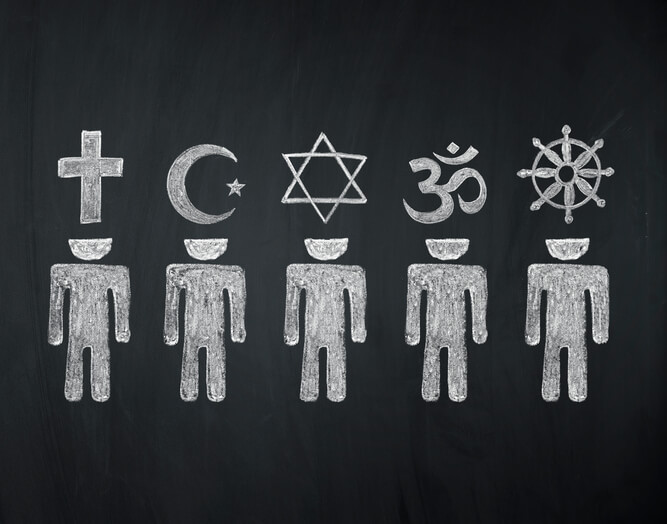Hopeful parents thinking about surrogacy have many things to consider before embarking on this life-changing journey. For those with a strong faith, they may need to consider how their religion will factor into their surrogacy process, as well.
Religion and any kind of assisted reproductive technology has always been a complicated issue. Many faiths emphasize the importance of a husband and wife conceiving naturally on their own, and involving anyone else in this process can be viewed as unholy.
However, as infertility and IVF become more everyday topics of conversation, many religious people have begun to change their views on what is acceptable within their faith — recognizing that it’s having a family that’s more important than the process behind it.
Religious Views on Surrogacy
Each faith is different and, therefore, what your faith may say about assisted reproductive technology and surrogacy may differ from what’s written below — based on your personal beliefs and that of your local congregation and religious leaders.
In general, here is how some major faiths view surrogacy:
-
- Catholicism: While surrogacy is present in the Book of Genesis with the story of Sarah and Abraham, the Catholic Church does not advocate for surrogacy. Instead, the Church teaches that children are a gift from God, only to be conceived and carried naturally by a married husband and wife. Any addition of a third party to this process is considered immoral.
-
- Protestantism: Because there are many different factions of Protestantism, views of the surrogacy practice will vary. However, these sects of Christianity are usually more liberal, and surrogacy and other assisted reproductive technology may be more accepted among certain religious groups.
-
- Judaism: Like with other faiths, more conservative Jewish factions do not approve of surrogacy. In vitro fertilization can be completed under rabbinical supervision, but there is a complicated discussion regarding the heritage of a child born via egg donor (as Jewish heritage is matrilineal). More liberal religious thinkers may accept surrogacy as a way to ease the suffering of infertile couples.
-
- Islam: Muslim views of surrogacy can be wide-varying. Some scholars argue that the process is akin to adultery and that the child has no legal lineage, while others claim that surrogacy is an integral part of the belief that humans have a responsibility to preserve the human species however they can. Some more modern Muslims believe that IVF and surrogacy is allowable as long as semen and ovum are from a married couple, while Sunni Muslims believe no third-party assistance should be permissible.
-
- Buddhism: Surrogacy is completely accepted in Buddhism, mainly because procreation is not seen as a moral duty. Therefore, couples are under no obligation to have children and, when they do, they can do so through whatever way they deem fit.
- Hinduism: Like many faiths, Hinduism and its views on surrogacy vary. In general, infertility treatments can be allowable, like through artificial insemination if the sperm is the husband’s. It’s important to note that surrogacy in India is a thriving industry, and many of the surrogates there are of Hindu faith.
Reconciling Surrogacy with Your Religious Beliefs
Because many religions were established thousands of years before IVF or gestational surrogacy could even be imagined, it can be difficult to determine whether surrogacy is really ethical for your religious beliefs.
Remember that all properly completed surrogacy processes protect the rights of both intended parents and surrogates in an ethical way, and both parties enter into the agreement together. It can be difficult to reconcile this positive process with something that many believe to be against their god’s will, especially if having children is so important to a certain religious culture.
If you are concerned about how your religious faith may play into your surrogacy process, we encourage you to speak to a trusted religious leader and other intended parents or surrogates who have been through the same process. They may be able to help you sort out your feelings and understand exactly what you feel is right and wrong about pursuing surrogacy with your religious convictions.
A surrogacy specialist can also speak to you about the American Surrogacy process so you can determine how it may affect your religious beliefs. There are also several faith-based surrogacy agencies specifically designed to address this family-building process from a religious standpoint.
Determining whether surrogacy is right for you is always a process that takes time, and considering your faith is an important part of this. It may help to join an online community, to see how other intended parents have dealt with similar situations.
We encourage intended parents and prospective surrogates to take the time you need to make the best decision for you. If you have any questions, contact us online or at 1-800-875-2229(BABY) today.
